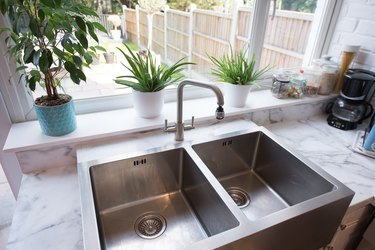
Whether you call it Super Glue or Crazy Glue, cyanoacrylate adhesive sticks to almost anything instantly, and once it dries, it's completely waterproof. You'd probably never put super glue in your stainless steel sink, but your kids might, and once it hardens on the surface, it's going to stay there until you remove it. The job won't be difficult, because you probably have the ideal super glue remover in your bathroom cabinet.
That super glue remover is acetone, which is a common ingredient in nail polish remover. If you don't polish your nails, you might have some acetone in your paint closet, because it's also a paint solvent. Not there either? Go ahead and buy some nail polish remover at the drug store after first reading the label to make sure it contains acetone.
Video of the Day
Video of the Day
Don't Just Scrape Off the Super Glue
The super glue may have beaded up to form hardened droplets, and you may be tempted to try scraping it off your stainless steel sink with a razor blade. But there's a good reason why you shouldn't.
Stainless steel has a chromium oxide finish that protects the steel from rusting, and although it's hard, you can definitely scratch it. When you do, and you expose the underlying steel, it forms iron oxide rust. So, where you once had a fairly innocuous droplet of super glue, you now have an ugly rusted scratch mark. This can be repaired, but it's a lot more trouble to do it than to simply remove the super glue the right way.
The Right Way to Remove Super Glue
Once you have your super glue remover in hand, moisten a rag with acetone and rub the super glue away. Acetone is super glue's kryptonite, and it's the solvent Loctite, the manufacturer of the product with the brand name Super Glue, recommends. It will take care of it in fairly short order, although you may have to rub a while, with extra helpings of acetone, to remove a large deposit.
You should observe caution when using acetone. It's flammable, so don't use it near open flames. If you have a gas stove, make sure the burners are off.
You should also remember that acetone emits noxious VOCs, so if you're sensitive to them, use a respirator and keep the windows open to provide ventilation. One more thing to remember is that acetone can damage wood finishes, so keep it away from your kitchen countertops, and don't drop any on the floor.
Some Alternatives to Acetone
If you don't have any acetone and you're in a hurry or you don't want to buy any, you can use denatured alcohol as an alternative super glue remover — that is, if you have some in your paint closet. It won't work as quickly as acetone, and you may have to rub harder, but denatured alcohol will eventually get the job done. You can also use lighter fluid, but because it's obviously flammable, it's even more important to avoid open flames.
Hydrogen peroxide is a third alternative. Douse a cotton swab with the same peroxide solution you use to disinfect wounds and hold the swab on top of the glue for as long as it takes to soften so you can rub it off.